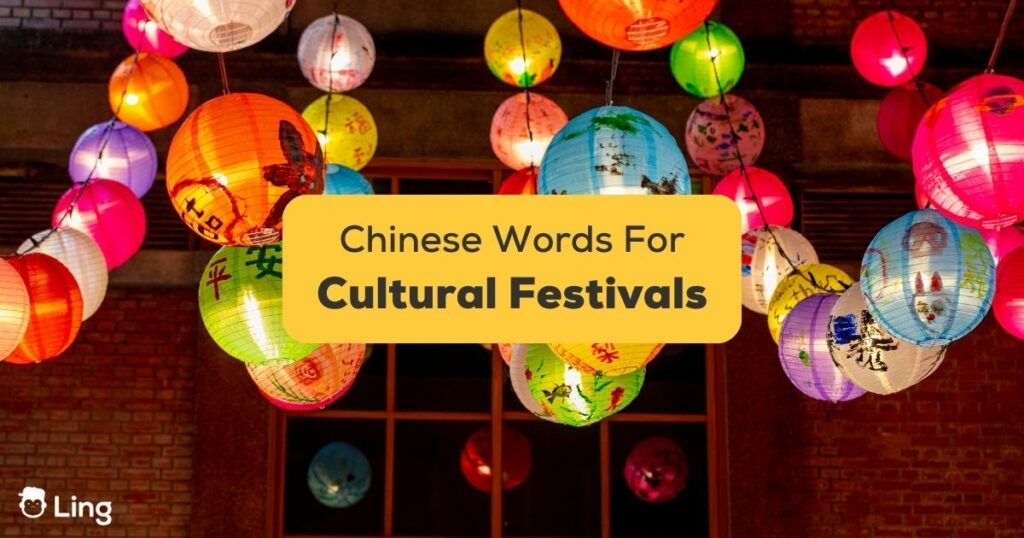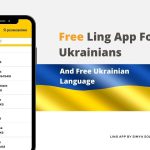Exploring China? A great way to immerse yourself in its rich culture is by learning the Chinese words for cultural festivals. From the colorful lanterns of the Spring Festival, or “春节” (Chūn Jié), to the rhythmic dragon dances of the Dragon Boat Festival (“端午” – Duān Wǔ Jié), each celebration offers a window into China’s fascinating traditions.
Picture yourself savoring delicious mooncakes during the Mid-Autumn Festival, or “中秋节” (Zhōng Qiū Jié), or marveling at the breathtaking fireworks of the Lantern Festival, or “元宵节” (Yuán Xiāo Jié). So why wait? Let’s embark on this linguistic journey to make your China travels not just memorable but absolutely enchanting!
The Significance Of Chinese Cultural Festivals
Chinese cultural festivals, or “文化节” (Wénhuà jié), are vibrant tapestries woven with history, traditions, and values. The Spring Festival marks family reunions and the flow of time, while the Mid-Autumn Festival underscores unity. These celebrations are more than mere spectacles; they are portals to China’s heritage. They enable people to reconnect with their roots, passing down wisdom through generations.
Beyond borders, these festivals extend an invitation to the world, fostering cross-cultural understanding and global appreciation. In essence, they embody China’s enduring legacy and serve as bridges to cultural diversity and harmony.
Chinese Cultural Festivals
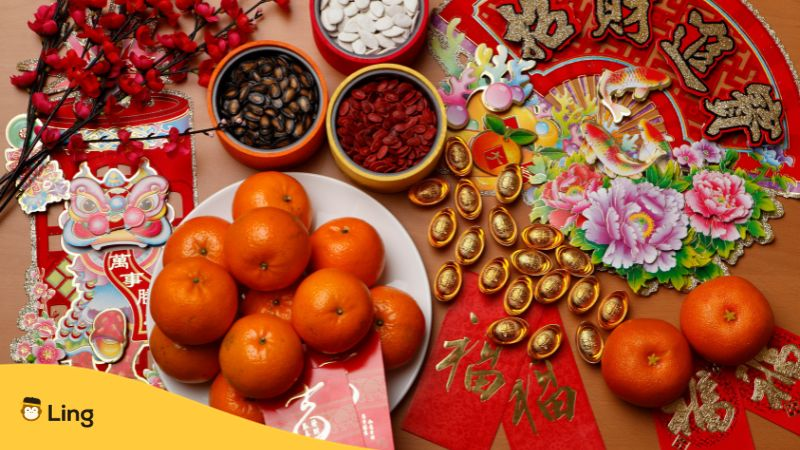
Chinese New Year (Spring Festival)
Ready to say “Happy New Year!” or “新年快乐” (Xīnnián kuàilè) in Chinese? The lunar new year begins on Chinese New Year, often called the Spring Festival. Families get together during this season to exchange presents and eat customary fare like dumplings. The celebration is distinguished by colorful parades, dragon dances, and recognizable red lanterns that signify fortune and luck.
Mid-Autumn Festival (Moon Festival)
The Moon Festival, also known as the Mid-Autumn Festival, honors family reunions and the harvest season. The usual way to celebrate the full moon is through sharing mooncakes, which are circular pastries with sweet fillings, and lighting vibrant lanterns. It’s a moment to show love and harmony among family members.
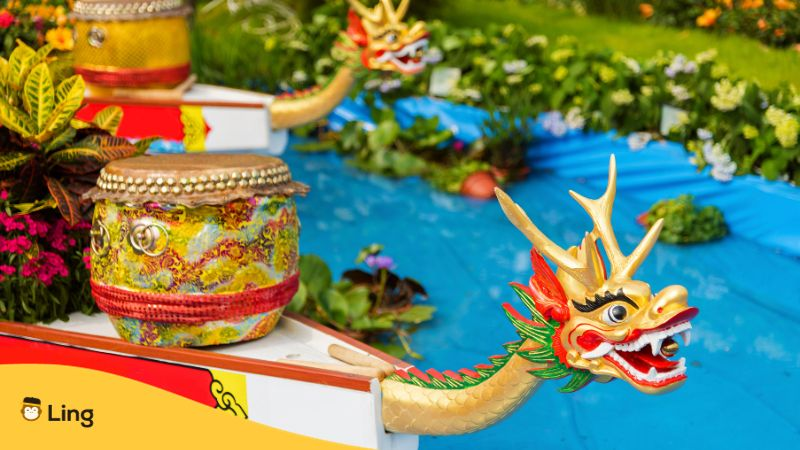
Dragon Boat Festival
Qu Yuan, a celebrated poet, is honored at the Dragon Boat Festival. There are exciting dragon boat competitions where competitors paddle ferociously to the rhythm of drums. It is a cultural and sporting event combined with the consumption of zongzi (sticky rice dumplings wrapped in bamboo leaves) and the hanging up of herbal pouches to ward off evil spirits.
Qingming Festival (Tomb-Sweeping Day)
During the Qingming Festival, Chinese people pay respect to their ancestors by visiting their graves and cleaning up their cemeteries. It frequently entails lovely outings to take in the springtime beauty and kite flying. The focus of the celebration is on honoring the deceased while celebrating nature’s regeneration.
Double Ninth Festival (Chongyang Festival)
The ninth day of the ninth lunar month is observed as the Double Ninth Festival, sometimes referred to as the Chongyang Festival. To fend off ill luck, people frequently climb mountains, don cornel flowers, and sip chrysanthemum wine. It’s a day to show respect for the elderly and enjoy the autumn beauty of nature.
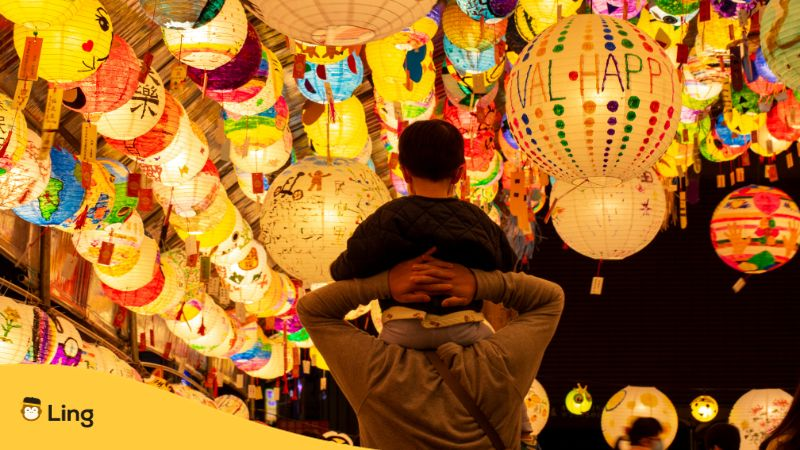
Lantern Festival
The Chinese New Year celebrations come to a conclusion with the Lantern Festival, which takes place on the fifteenth day of the lunar calendar. A stunning spectacle is created when groups of families come together to release colorful lanterns into the night sky. During this holiday, tangyuan (sweet rice balls) are also relished, as they stand for unity and peace.
Ghost Festival (Hungry Ghost Festival)
The Ghost Festival is a time to celebrate and appease wandering ghosts. People give their ancestors and roaming ghosts food, incense, and paper currency. Common rituals to honor and care for the departed include theatrical performances and the releasing of floating lanterns onto the water.
Laba Festival
The eighth day of the twelfth lunar month—Laba Festival—marks the start of Chinese New Year preparations. It involves eating Laba porridge, which is made from several grains and nuts and represents the expectation for a plentiful crop. Events are frequently held by temples and towns to give away this nourishing porridge to the less fortunate.
National Day (Golden Week)
October 1st is China’s National Day, which commemorates the establishment of the People’s Republic of China. Golden Week is a weeklong holiday during which people travel, visit historical locations, and take part in a variety of patriotic activities and celebrations, such as fireworks displays and parades. This is a time to celebrate national togetherness and pride.
Chinese Words For Cultural Festivals
Imagine fluently talking with Chinese people when attending their cultural festivals. What a dream, right? But hey, this can be possible by learning these words we prepared below and expanding your vocabulary!
| English | Chinese | Pronunciation |
|---|---|---|
| Festival | 节日 | Jiérì |
| Celebration | 庆典 | Qìngdiǎn |
| Tradition | 传统 | Chuántǒng |
| Ceremony | 仪式 | Yíshì |
| Lantern | 灯笼 | Dēnglóng |
| Dragon | 龙 | Lóng |
| Fireworks | 烟花 | Yānhuā |
| Red envelope | 红信封 | Hóng xìnfēng |
| Parade | 游行 | Yóuxíng |
| Family reunion | 家庭团聚 | Jiātíng tuánjù |
| Lion dance | 舞狮 | Wǔ shī |
| Dumplings | 水饺 | Shuǐjiǎo |
| Mooncake | 月饼 | Yuèbǐng |
| Zodiac | 十二生肖 | Shí’èr shēngxiào |
| Incense | 香 | Xiāng |
| Temple | 寺庙 | Sìmiào |
| Special customs | 特殊习俗 | Tèshū xísú |
| Traditional festival | 传统节日 | Chuántǒng jiérì |
Learn Chinese With Ling!
Have you had fun learning about Chinese festivals? Are you ready to embark on a thrilling journey into the world of Chinese and discover its culture? Look no further; we’ve got the perfect companion for your language-learning adventure: the Ling app!
Picture this: You’re sitting at home, sipping your favorite tea, and suddenly decide, “Hey, I want to learn Chinese!” Well, the Ling app is your genie in a bottle, ready to grant your linguistic wishes. But here’s the kicker – it’s not just about Chinese. The Ling app is like a treasure chest of languages, offering you a whopping 60+ foreign tongues to explore. It’s like having your own private tower of Babel, minus the confusion.
Need something a bit more structured? The Ling app’s got your back with comprehensive lessons that take you from “ni hao” (hello) to fluent in no time. It’s like having a personal language tutor in your pocket, 24/7!
Just head over to the App Store or Google Play Store, download the Ling app for free, and start your journey to becoming a Chinese language master.
